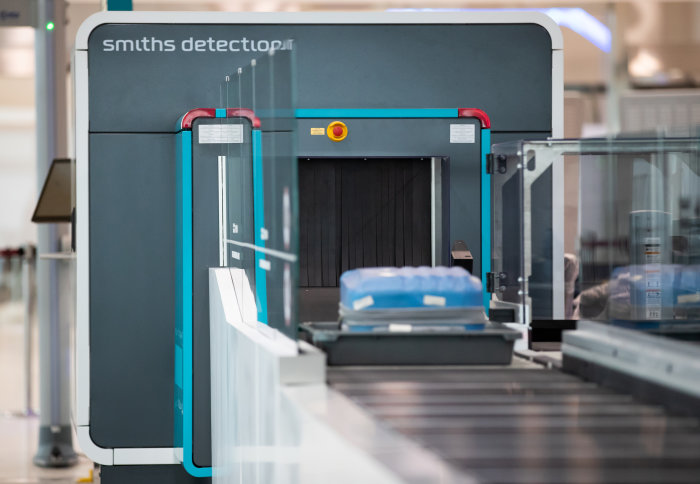Imperial ISST and Smiths Detection awarded funding for joint PhD project

Image credit Smiths Detection
The PhD research will develop latest techniques in deep learning to improve automated threat detection in next-generation airport baggage scanners.
Over recent decades, one of the key advances in aviation security has been equipping X-ray baggage scanners with software for automatic threat detection.
Although highly successful in uncovering harmful objects, screening technologies will need to become increasingly sophisticated in order to adapt to evolving threats and predicted growth in air traffic.
The ability to detect emerging threat materials and objects in baggage, whilst maintaining or even enhancing the passenger transit experience, has been identified as a critical challenge by the UK Government’s Department for Transport (DfT).
Imperial College London’s Institute for Security Science and Technology (ISST) and Smiths Detection will now address this challenge thanks to funding from DfT and the Home Office under their joint Future Aviation Security Solutions (FASS) programme.
Next generation scanners
The research will combine cutting edge STEM capabilities from Imperial and Smiths Detection to develop new automated threat analysis on the latest generation of CT hand luggage scanners, which were recently commercialised by Smiths Detection.
Whilst current scanners produce 2D images, this new breed of scanner relies on Computed Tomography to generate 3D images, which provide human operators greater clarity with what they are seeing.
This has become increasingly important due to the changing nature of terrorist and criminal methods, the need to process more passengers in a short time, and the increase in carry-on electronic items which can obscure scans, according to Professor Deeph Chana, Co-Director of the ISST.
“The next generation of security technologies for aviation will need to provide increased operational efficiency, together with improvements in detection capability. The ability to have X-ray computed tomography screening at passenger check-points has been a goal in this regard for some time and numerous engineering challenges have had to be addressed to get us to the point where this has become a reality.” Said Deeph.
Deep learning
The collaboration will focus on developing convoluted neural networks – a class of deep learning algorithms – for analysing the 3D images from this new generation of scanners.
Imperial College London is recognised as a world-leader in artificial intelligence and machine learning, and has a broad range of capabilities to draw upon including the Institute for Security Science and Technology, and the Artificial Intelligence Network.
“The partnership between Smiths Detection and Imperial’s Institute for Security Science and technology on this PhD studentship aims to advance what can be done using machine learning to optimise the use of the data generated by such platforms, bringing together world leading commercial and academic STEM expertise in aviation security systems.” Said Deeph.
Smiths Detection is a global leader in threat detection and security screening technologies. Their detection technologies are found in many of the world’s busiest airports, keeping millions of passengers safe each year.
“This is an exciting next step in our strategic partnership with Imperial College London and the ISST, allowing us to collaborate on the development of innovative technology for aviation security and expand this field of knowledge. This PhD and our ongoing partnership with one of the leading science and technology universities in the world, aligns with our ambition to provide next-generation security solutions that help to make the world a safer place,” said Matt Clark, Smiths Detection Vice President, Technology.
PhD opportunity
The ISST and Smiths Detection will soon start looking for a suitably qualified candidate to undertake the PhD research.
An advert will be posted on the ISST website soon, and in the meantime interested candidates can contact securityscience@imperial.ac.uk for information.
Article text (excluding photos or graphics) © Imperial College London.
Photos and graphics subject to third party copyright used with permission or © Imperial College London.
Reporter
Max Swinscow-Hall
Institute for Security Science & Technology